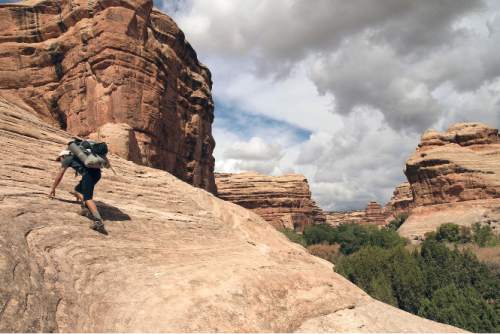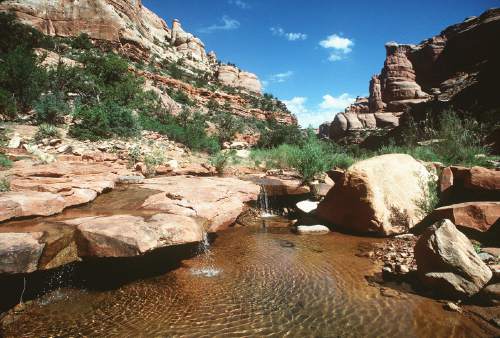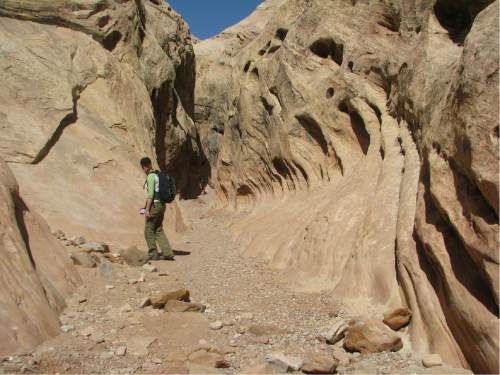This is an archived article that was published on sltrib.com in 2016, and information in the article may be outdated. It is provided only for personal research purposes and may not be reprinted.
Attorney General Sean Reyes and a top deputy are offering input on a potential state lawsuit demanding the federal government relinquish ownership of 30 million acres within Utah's borders, although the state is unlikely to file the suit until next year, according to a lawmaker leading the effort.
Lawmakers want to hold off on the suit, said Rep. Keven Stratton, R-Orem, the chairman of the Commission for the Stewardship of Public Lands, in order to give U.S. Rep. Rob Bishop's Public Lands Initiative — a bill designating land uses on 18 million acres in the state — a chance to pass in Congress and to see who the next president appoints to fill a U.S. Supreme Court vacancy.
"Logically, realistically we've got to have nine justices. It's not going to do any good to have it before the Supreme Court right now because it will be a split decision right now, most likely," Stratton said.
But that doesn't mean that a victory by Democrat Hillary Clinton and a liberal Supreme Court nominee would scuttle the suit, Stratton said. And drafting a lawsuit doesn't mean the state is trying to pick a fight, he said.
"I think that's like saying you want a war because you have an army or you're prepared with a defense," Stratton said. "The reality of a substantial and well-thought-out lawsuit is there. Just like the reality that if one nation can't agree with another nation they can go to war. But you would hope that reasonable minds would rule the day and we could work through a legislative solution."
A law firm hired by the commission has been crafting a draft complaint that Reyes could file if he and Gov. Gary Herbert agree to go forward.
Rep. Ken Ivory, who has been a leader of the drive to sue the government over the ownership of public lands, wrote an editorial in The Tribune on Wednesday endorsing Herbert's Republican challenger for governor, Jonathan Johnson — who has said he would sue over the lands if he's elected — and chastised Herbert, who he said has "at best, stood idly by" for the past seven years "as federal control over our state metastasizes."
"Jonathan Johnson knows that Utah will never be anything more than a colony of D.C., deprived of our full ability to fund education and care for our lands, unless we compel the federal government to relinquish our lands on terms of equality and fairness with all states east of the Rockies," Ivory wrote.
Herbert has said that filing the lawsuit now would torpedo Bishop's public lands bill and prompt the Obama administration to create the 1.9 million-acre Bears Ears National Monument in southeastern Utah.
Stratton had said he hoped to have the draft finished by Wednesday, but he said that for now Reyes and his deputy and general counsel, Parker Douglas, are providing input and the final product will take time to complete.
Utahns are split on the issue of whether the state should proceed with the lawsuit, which has an estimated price tag of $14 million, according to a new poll conducted for the Western Values Project, a regional environmental group.
The poll, conducted by Public Policy Polling, showed that 48 percent of Utahns oppose the lawsuit while 47 percent support it. When respondents were read statements about the downside of state ownership of the land — including other areas the money could be spent, the cost of managing the lands, and the benefits to corporate interests and their lobbyists — opposition rose to 61 percent.
The poll of 592 Utah voters was conducted this week and had a margin of error of plus-or-minus 4 percent.
"The Utah Legislature might as well light that $14 million on fire, because that's going to be as productive as filing this lawsuit," said Chris Saeger, Director of the Western Values Project, a regional environmental group. "This is an expensive and risky plan that the governor and attorney general should reject in the interest of fiscal responsibility."
Stratton did provide his colleagues Wednesday with some additional detail on how the commission has spent $347,681 in taxpayer money that had been billed for "relations services."
Strata Policy, a consulting firm affiliated with Utah State University, was paid $135,578 to identify Utah residents who have been adversely affected by federal-land decisions.
The state paid Nuffer Smith Tucker, a San Francisco media firm, $90,702 to produce "educational materials" supporting the commission and produce a video with members of the legal team hired by the commission promoting the litigation.
The commission paid Y2 Analytics, a Utah-based polling firm, $67,300 to gather data to identify compelling themes to support the legal argument. Method Communications was paid $16,050 to develop ways to effectively communicate the legal findings.
And the lobbying firm of Foxley & Pignanelli was paid $34,862 to help the out-of-state legal team understand Utah's political dynamics.
Salt Lake City Sen. Jim Dabakis, one of two Democrats on the commission, said spending that much money to sell the idea of the lawsuit to the public is a "ridiculous" waste of public money.
"What do you need public relations for in a lawsuit?" Dabakis said. "This is being spent because the poll numbers on public land issues in the state are plummeting. People are understanding they want this land protected by the federal government and they don't want the state's hands on it because the state is selling it off as fast as it can get its hands on it. And they're looking for a strategy that will let their political agenda go forward and they're charging the taxpayers for it and it's a nasty thing."
Twitter: @RobertGehrke







